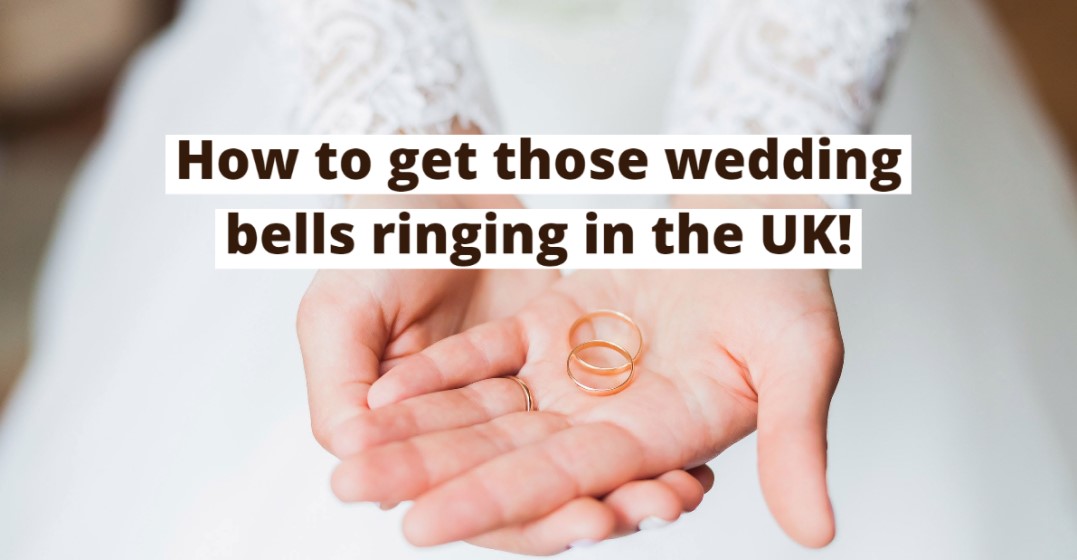How to Get Married in the UK
Published on April 14, 2020 / Updated on November 8, 2022
Getting married is, possibly, one of the most special things you will ever do. It can also be one of the most stressful things you ever do. From selecting your location, deciding your numbers, choosing your bridal party, picking the band, arranging the seating so that your uncle Brendan doesn’t chew the ear off your mother in law, it can all get a bit much. But once you’ve decided to get married and in the UK, you need to know the basics.
Whether you live there, are marrying a British person or just like the stunning countryside, it doesn’t have to be an overwhelming experience. Yes, there’s lots of new vocabulary, documents to prepare, maybe even visas to be obtained, but it is all manageable. How before you get to all the lovely parts of vows, outfits, music and food, you need to sort out a few of the boring, legal details first.
Both religious and civil ceremonies are widely accepted in the UK. Both need to take place in registered locations, be it a registry office, a church or a synagogue for example. For civil ceremonies you need to register your intention to marry in your local district 28 days in advance of your ceremony. While you don’t need to get married in that district you still need to register there first. You then have a year to carry out the ceremony. You also need to be resident in the country 7 days prior to registration. See below for the paperwork required.
While same sex couples can have civil ceremonies and have their right to marry legally recognised, not all religious institutions are supportive of their rights. Currently same sex couples cannot marry in the Church of England or the Church of Wales.
This depends on whether you or your partner are resident in the UK. If you both are resident, then you’re fine and dandy. If your partner is and you’re not but you are an EU national, from the European Economic Area (EEA) or from Switzerland, then you don’t need a visa. Of course this may change after Brexit finally happens. If you’re none of the above, then you may be required to have a visa or declare your immigration status. Even if you’ve never needed a visa to visit the UK before. This is, of course, to ensure you’re not marrying under duress or for a handy UK citizenship.
The visa you need depends on your partner and whether you want to remain in the UK afterwards.
There are several requirements, some of them we covered above such as needing a visa. You also need to be aged 16 and over, though technically 16 and 17 year olds need parental permission to get married. You need to be free to marry. In other words divorced or widowed if you were already married. On the day of the ceremony you will need two witnesses, neither of whom can be the registrar.
Okay, so you have your partner, chosen your type of ceremony and know about your visa and your legal requirements. What next?
Well, now you need to get your papers in order. The first four are requirements for everyone.
Then, depending on your situation, you may be required to provide one or all of the rest:
That is a good question, are you? Some religious institutions, such as the Catholic Church, require you to take a marriage course first before you commit to those vows. But otherwise, yes, once you have all of the above (including your date and your venue which is needed for your registration) you are ready to start planning! Now you just need to decide what to wear, who your bridesmaid or best man will be (if you’ll have any – very contemporary decision these days), where you’ll sit your best friends Davos and Cindy and will you serve chicken or fish. At the least the hard part is over!
Wedding – the act or ceremony of marrying.
Ceremony – the process of actually getting married.
Religious – in a place of worship.
Civil – in a secular, usually government associated place.
Vows – the promises new partners make to each other.
Nuptials – same as ceremony.
Wedding rings – rings that are exchanged as a marker of your marriage.
Guests – the people you invite to celebrate with you.
Registrar – the person who performs the civil ceremony.
Registry office – the location of the civil ceremony.
Bride – traditional term for a woman getting married.
Groom – traditional term for a man getting married.
Divorced – the term used for someone who was previously married.
Widowed – the term used for someone whose previous husband or wife died.
[/et_pb_text][et_pb_cta button_url=”https://www.lingoda.com/en/english/” url_new_window=”on” button_text=”Start now” _builder_version=”3.21.1″ body_font=”||||||||” body_font_size=”14px” background_color_gradient_direction=”311deg” border_radii=”on|4px|4px|4px|4px” custom_button=”on” button_text_color=”#ffffff” button_bg_color=”#ff8e5a” button_border_color=”#ff8e5a” button_border_radius=”100″ button_font=”|700||on|||||” button_use_icon=”off” button_alignment=”center” custom_padding_phone=”|5%||5%” custom_padding_last_edited=”on|phone” z_index_tablet=”500″ button_bg_color__hover_enabled=”on” button_bg_color__hover=”#ff7A48″ button_border_color__hover_enabled=”on” button_border_color__hover=”#ff7A48″]If you’d like to learn more about the English language, visit the Lingoda website and sign up for your free 7-day trial with our native speaking teachers today!
[/et_pb_cta][/et_pb_column][/et_pb_row][/et_pb_section]